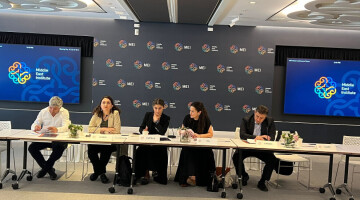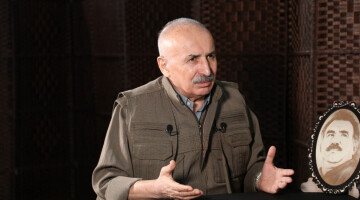A member of the Coordination of the Kurdistan Communities of Women (KJK) Dîcle Xabûr said in an interview with the Stêrk TV’s Rojeva Jin program that the activists carrying out a hunger strike against the isolation of Ocalan derive their strength from the spirit of the July 14 resistance, which was fought by the leaders of the Kurdistan liberation movement, Mazlum Dogan, Kemal Pir and Hayri Durmuş.
Xabûr stressed that popular solidarity with the campaigns is of great value yet it does not live up to the required level. “What are we waiting for to move?”, she asked.
Xabûr explained that the international conspiracy against the Kurdish people expanded with the abduction of Abdullah Ocalan, and continues today in various methods.
She stressed that Ocalan’s struggle over the past 20 years has failed all plans of the enemy, pointing out that the philosophy of Ocalan has spread to the whole world.
“Turkey, desperate in preventing the spreading of this idea, has sought to tighten the isolation. However, the indefinite hunger strike campaign led by Leyla Guven in Kurdistan and abroad has frustrated the isolation and proved that the idea and philosophy of Ocalan reached the heart of everyone everywhere.”
Xabûr pointed out that: "In the history of the Kurdish liberation movement, more than anyone, the women comprehended the reality and importance of each era by taking positions accordingly. The historic resistance and response of women derives from their sense of patriotism and commitment to their land. This feeling is what has kept the Kurdish culture, language and existence standing tall. The fact that women are leading the hunger strikes against isolation today is a continuation of the Kurdish women’s resistance. The Turkish state is targeting women because of their history of resistance.”
Xabûr continued: “After the 12 September 1980 coup, the enemy thought that they had crippled the Kurds but the July 14 resistance in the prison re-wrote the resistance of the Kurdish people. Today there is the same spirit of resistance in prisons but the popular struggle is not enough, despite being of great value. What are we waiting for? How can we accept this insufficiency while our comrades in prisons display such a great resistance?”
Xabûr called on all the Kurdish people to join strongly in the events organized by the Kurdish organizations and parties in the context of exposing the crimes and massacres of the Turkish state.
Mentioning the triple murders of Sakine Cansız, Fidan Doğan and Leyla Şaylemez in Paris on January 9, 2013 and of Seve Demir, Pakize Nayir and Fatma Uyar in Silopi district of Şırnak on January 4, 2016, Xabûr said: "The perpetrator of these massacres against our people is the Turkish President Recep Tayyip Erdogan but intelligence service MIT. Although the perpetrator is evident, the cases are being covered up.”
Regarding the preventing of the screening of a film about the life of Sakine Cansiz (Sara) in the city of Sulaymaniyah in South Kurdistan, Xabûr explained that this step does not serve in any way the unity of the Kurdish people.
Commenting on the US decision to pull out troops from Syria, KJK member Dîcle Xabûr said: “We cannot ask a force that is not supposed to be there since the first day anyway why they are withdrawing troops now. Basically, no international or occupation force should be there on the Syrian land.”
According to Xabûr, this is a politics aimed at disturbing the alliance between Turkey and Russia. She pointed out that the US actually started this process by putting a bounty on three leaders of the Kurdistan Liberation Movement; Duran Kalkan, Murat Karayılan and Cemil Bayık. She described this process as a new concept against the Kurds.
Xabûr concluded by referring to the KJK’s Coordination declaration of mobilization for six months, stressing that "It is the duty of not only the Kurdish women but also of Arab, Syriac and Armenian women to rise up and give an all-out struggle against all occupation forces and their policies.”














